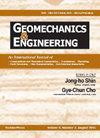Allowable wall deflection of braced excavation adjacent to pile-supported buildings
IF 2.4
3区 工程技术
Q2 ENGINEERING, CIVIL
引用次数: 0
Abstract
To protect adjacent buildings is a major concern for the construction of excavation in urban areas. In practice, the impacts on neighboring pile-supported buildings are normally minimized by limiting the deflection of earth retaining wall. Existing deflection criteria, however, are often empirical. In this work, we employ an analytical model to relate the wall deflection of braced excavation to the response of adjacent pile-supported buildings and thus forming a theoretical tool for determining the allowable deformation of excavation support structures based on the tolerance of buildings to distortion. The model combines closed-form excavation-induced free-field soil movements with elastic continuum solution that explicitly accounts for the interactions between raft, piles, and soils. Following validation against field model test and finite element simulation, the model is utilized to reveal the correspondence between the angular distortion of pile-supported buildings and the maximum retaining wall deflection under different combinations of excavation geometry, soil properties, and parameters of pile foundation potentially encountered in practice. A dimensionless factor composed of these influencing variables is proposed, and its correlation with the ratio of the building angular distortion over the maximum retaining wall deflection provides a rational way to determine the serviceability limit states of braced excavation.桩承式建筑物旁支撑开挖允许墙体挠度
保护邻近建筑物是市区挖掘施工的一个主要问题。在实际应用中,通常通过限制挡土墙的挠度来减小对邻近桩基建筑的影响。然而,现有的挠度准则往往是经验的。在这项工作中,我们采用了一个解析模型,将支撑开挖的墙体挠度与邻近的桩基建筑的响应联系起来,从而形成了一个基于建筑物对变形的容忍度来确定开挖支护结构允许变形的理论工具。该模型结合了封闭形式的开挖引起的自由场土壤运动和弹性连续体解决方案,明确地说明了筏板,桩和土壤之间的相互作用。通过现场模型试验和有限元模拟验证,揭示了在实际可能遇到的开挖几何形状、土体性质和桩基参数的不同组合下,桩支建筑的角变形与最大挡土墙挠度之间的对应关系。提出了由这些影响变量组成的无量纲因子,并将其与建筑物角变形与挡土墙最大挠度之比的关系,为确定支撑开挖的使用极限状态提供了一种合理的方法。
本文章由计算机程序翻译,如有差异,请以英文原文为准。
求助全文
约1分钟内获得全文
求助全文
来源期刊

Geomechanics and Engineering
ENGINEERING, CIVIL-ENGINEERING, GEOLOGICAL
CiteScore
5.20
自引率
25.00%
发文量
0
审稿时长
>12 weeks
期刊介绍:
The Geomechanics and Engineering aims at opening an easy access to the valuable source of information and providing an excellent publication channel for the global community of researchers in the geomechanics and its applications.
Typical subjects covered by the journal include:
- Analytical, computational, and experimental multiscale and interaction mechanics-
Computational and Theoretical Geomechnics-
Foundations-
Tunneling-
Earth Structures-
Site Characterization-
Soil-Structure Interactions
 求助内容:
求助内容: 应助结果提醒方式:
应助结果提醒方式:


